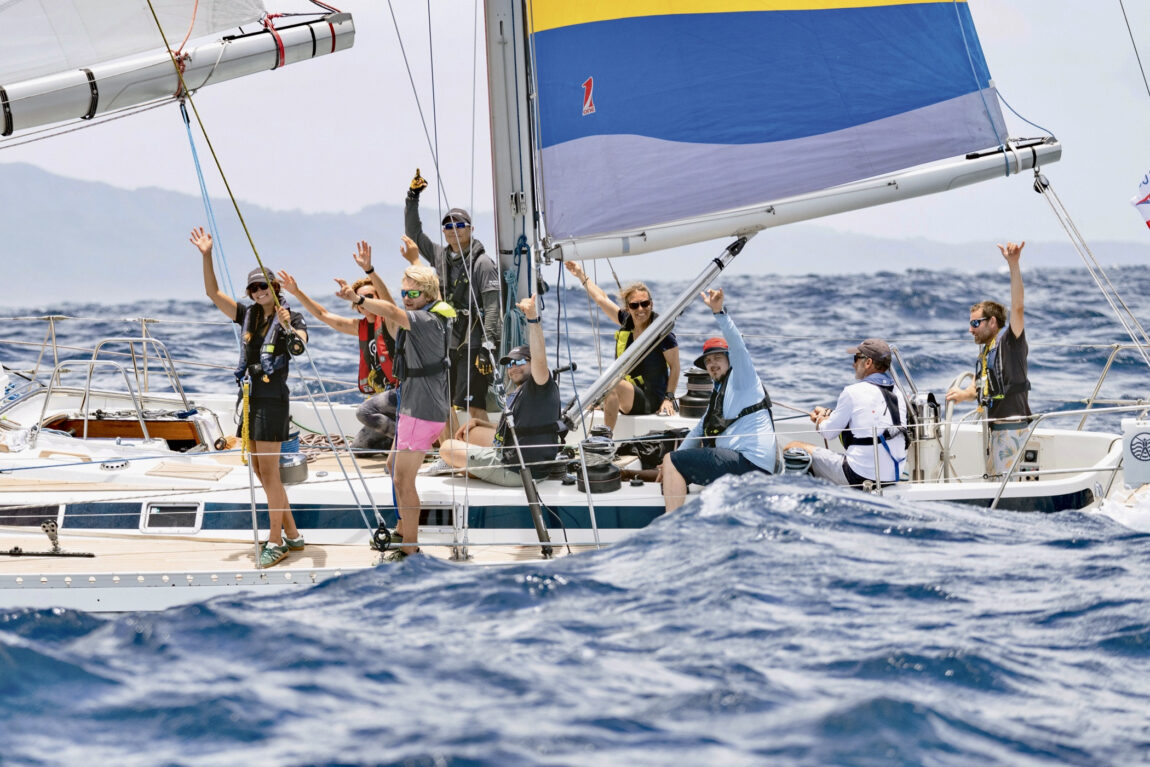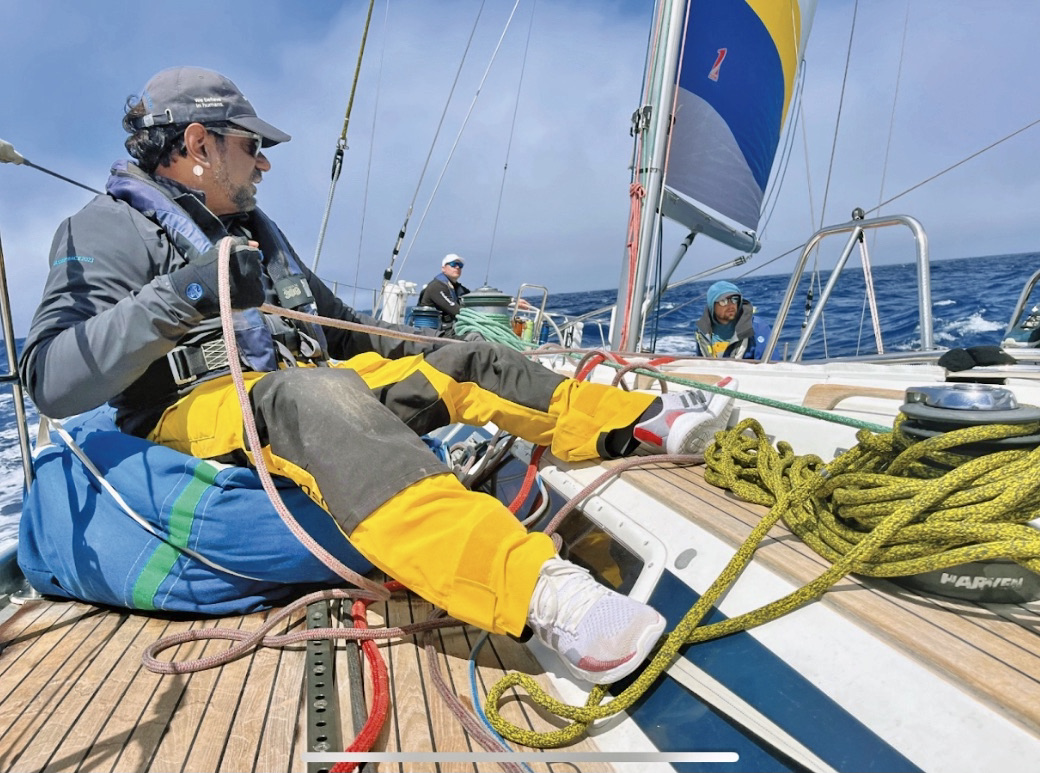
‘Translated 9’s Money Pac Cup
“Money. It’s a hit. Don’t give me that do goody good bullshit.” Racing 2,070 miles from San Francisco to Hawaii, the 11-person crew of Translated 9 blared Pink Floyd’s Money as they crossed the finish line at Kaneohe Bay, Oahu, winning first place in their division in the 2024 Pacific Cup. The Swan 65 ketch won among 10 boats in the Pac Cup’s Naos Yachts PHRF 4 class, and took fourth overall among 65 boats. The team finished ahead of the second-place boat by 19 hours, setting sail at 11:40 a.m. on July 17 and clocking 10 days to finish at 12:45 p.m. on July 27.

“The theme of the trip was any time we were on the favored tack or jibe, Paul Cayard would shout, ‘Money!’ Then someone started playing Pink Floyd’s Money. So it naturally became our theme song. As we crossed the finish line, we had it blasting on the boat speakers,” recalls team navigator Alex Dailey.
The team’s start was less than promising. Winds were unusually still (0–7 knots in the evening), while breaching whales close by added to a feeling of anxiousness. Translated 9 tripped at the start, and for a few nail-biting moments, the team was looking like the long shot. “With a minute to go to the start, we lost all power in our winches due to a circuit breaker tripping. So we were barreling to the line without any ability to trim,” shared Alex. “Our boat captain, Jon, scrambled down below, shouted a few times, fixed it with about 20 seconds to go. We nailed the start, tacked to starboard, and led the pack out as our friends and family cheered from the St. Francis Yacht Club.
“After the first day we realized we had the boat speed to be competitive, if not win, so the intensity of the racing and decisions went to 11,” Alex added. The 11-person crew worked in two groups of five with one floater, working 24/7 in four-hour shifts. For hot-bunking and sharing tight quarters, building the right team of people seems like a secret ingredient for success that was planned well before the start. Seven hundred applicants were considered before the final “all-star” crew was selected, including Lana Coomes, Alex Dailey, Danny Cayard, Jason Chan, Kelly Gregory, Baptiste Gillot-Devillers, Patrick Haesloop, Jitendra Kavathekar, and Teresa Marshall, captained by Jonathan Hammond. The team was guided and coached by Paul Cayard, the National Sailing Hall of Fame inductee, who twice circumnavigated the world and competed in multiple sailing championships, including the America’s Cup. Translated 9’s crew trained together on San Francisco Bay multiple times leading up to the race, both to practice and to learn how each person fit within the team.

“The crew was the most amazing part, all seamlessly working together, taking care of one another and pushing the boat hard,” shared Kelly Gregory, a veteran of multiple ocean legs and a Pac Cup doublehanded alum. “Good crew dynamic is what I think is the key to winning a race.” Jitendra Kavathekar, who was competing in his first Pac Cup, added, “The crew gelled very well with each other. I got a huge influx of guidance and coaching and I felt there was a sincere sense of all of us learning. My primary takeaway was the ability to step out of my comfort zone and go beyond my limits. This is encapsulated in the Translated 9 motto: ‘Believe in humans. Believe in yourself. Never give up.'”
“Believe in humans” is stenciled prominently on the side of the boat’s hull, a motto shared by the boat’s owner, Translated, a translation and localization service based in Rome. The company’s sailing ethos runs deep, and it even sponsored another Swan 65, also called Translated 9, that competed in the 27,000-mile Ocean Globe Race in 2023. Company co-founder Marco Trombetti insists that the Translated motto is more than clever branding. “It’s about believing in the capacity of individuals to overcome challenges,” shared Marco. “In both business and sailing, the journey is as important as the destination. Both involve navigating unknown waters, facing unforeseen challenges, and relying on a blend of strategy and intuition.”
Translated 9‘s journey was not without its own unforeseen challenges. “We were caught with the spinnaker up in a 30-plus-knot squall and all you can do on that boat is hold on tight and keep the wind at the stern,” shared Kelly. “About as far from land as possible in the middle of the race, we pushed really hard on the A4 [spinnaker] through a building breeze. From about 0300 to 0500 in the pitch black, we broke three spinnaker guys in a row. Each one sounded like a gunshot going off and you could hear the rig straining through the hull as we rushed on deck to rerun the lines,” recalled Alex. “It was nail-biting to keep the ship as stable as possible in a confused seascape while the crew worked on the bow,” added Jitendra.
Another winning factor for the Translated 9 team, besides high morale, included especially close attention to detail in their navigation. During the Ocean Globe Race, Translated’s Marco Trombetti analyzed 20 years of historical data to determine the optimal sail configurations and course, and he encouraged that same breadth of research for the Pac Cup race. The team’s navigator, Alex Dailey, who says he trained in ocean navigation through Club Nautique and US Sailing’s Offshore Passage Making (OPM) program, shared his own insights for others planning to sail in the Pac Cup.
“First, dial in your instruments beforehand to get accurate readings, especially downwind sailing where the updraft or swell acceleration can affect your wind readings. Good readings cannot be stressed enough. Second, get good at running scenarios over wind speed and overall wind rotation variations,” said Alex. “No GRIB will match what you are seeing on the water, and you’ll have to pick a forecast and modify it to what’s happening around you.”
See more photos and read more great Sightings stories in October’s Latitude 38.
